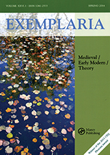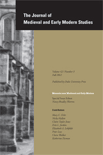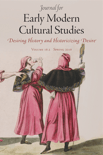
Exemplaria-Medieval Early Modern Theory
Scope & Guideline
Fostering Dialogue Across Literary Eras
Introduction
Aims and Scopes
- Interdisciplinary Exploration:
The journal emphasizes the integration of diverse fields such as literature, history, music, and visual arts, promoting a comprehensive understanding of medieval and early modern studies. - Theoretical Engagement:
There is a consistent focus on theoretical frameworks, including posthumanism, queer theory, and material culture, allowing for a critical analysis of texts and cultural artifacts. - Cultural and Historical Contextualization:
Papers often contextualize literary works within their historical and cultural settings, addressing themes of race, gender, and sexuality, thereby enriching the discourse surrounding premodern texts. - Sensory and Material Studies:
The journal has a unique contribution in exploring sensory experiences and materiality, examining how these elements influence the understanding of texts and their reception in both historical and modern contexts. - Performance and Reception:
There is a notable interest in the performance aspects of literature, including the role of sound and music, which highlights the dynamic nature of textual interpretation in historical periods.
Trending and Emerging
- Posthumanism and Materiality:
Recent publications frequently engage with posthumanist theories and material culture, exploring the relationships between humans, objects, and environments, which is vital for understanding premodern societies. - Sound Studies and Aurality:
There is a growing trend towards examining sound and music within medieval and early modern texts, emphasizing the role of auditory experiences in shaping cultural and literary interpretations. - Queer Theory and Nonbinary Perspectives:
The journal is increasingly focusing on queer perspectives and nonbinary identities, reflecting a broader cultural shift towards inclusivity and the exploration of diverse gender expressions in historical contexts. - Environmental and Ecocritical Approaches:
Emerging themes include ecological and environmental studies, which investigate how medieval and early modern texts engage with nature, sustainability, and the human-nature relationship. - Digital Humanities and Technological Interactions:
The journal is witnessing a rise in papers that explore the intersections of digital humanities and medieval studies, particularly how digital tools and platforms can enhance research and accessibility of historical texts.
Declining or Waning
- Traditional Historicism:
There appears to be a waning interest in traditional historicism, as newer methodologies and interdisciplinary approaches take precedence, leading to a diminished focus on purely historical analyses without theoretical engagement. - Conventional Literary Criticism:
Themes centered around conventional literary criticism, particularly those that do not incorporate contemporary theoretical perspectives, are less frequently represented, indicating a shift towards more innovative and critical frameworks. - Static Gender Norms:
Discussions surrounding static or binary gender norms have become less common, as the journal increasingly embraces more fluid and complex understandings of gender and sexuality in its explorations. - Limited Focus on Canonical Texts:
There is a noticeable decline in papers focusing solely on canonical texts of medieval and early modern literature, suggesting a broader interest in lesser-known works and diverse voices within these periods.
Similar Journals

Studia Slavica et Balcanica Petropolitana
Advancing Interdisciplinary Insights into Slavic and Balkan StudiesStudia Slavica et Balcanica Petropolitana is an esteemed open-access journal, published by the Department of History at St. Petersburg State University, focusing on interdisciplinary research within the fields of Slavic and Balkan studies. Since its inception in 2007, the journal has made significant contributions to the academic discourse surrounding historical and contemporary issues pertinent to these regions, thus achieving a strong reputation among scholars. As of 2023, it is categorized in the Q2 quartile for History, ranked 873 out of 1760 in the arts and humanities segment, highlighting its impactful scholarly contributions. The journal operates out of Russia, with its editorial office located at Mendeleevskaya Liniya in St. Petersburg. Its accessible publishing model promotes widespread dissemination of knowledge, making it an invaluable resource for researchers, professionals, and students who aim to deepen their understanding of Slavic and Balkan societies from both historical and modern perspectives.

Neo-Victorian Studies
Navigating the Rich Tapestry of Neo-Victorian ExpressionNeo-Victorian Studies, published by Swansea University, is an esteemed interdisciplinary journal that delves into the vibrant cultural phenomena reflective of the Victorian era in contemporary contexts. Launched in 2008 as an Open Access platform, it invites scholars, researchers, and enthusiasts to explore the dynamic relationship between the past and present through critical discussions, innovative research insights, and theoretical frameworks. With a unique focus on the resurgence of Victorian themes and narratives in modern literature, arts, and media, this journal plays a pivotal role in advancing the understanding of neo-Victorianism within academia and beyond. Supported by a commitment to accessibility and scholarly excellence, *Neo-Victorian Studies* fosters an inclusive space for dialogue and discovery, making it an essential resource for those engaged in cultural studies, literature, and interdisciplinary research.

Magnificat Cultura i Literatura Medievals
Fostering Inclusive Research in Medieval HeritageMagnificat Cultura i Literatura Medievals, published by UNIV VALENCIA, SERVICIO PUBLICACIONS, is an esteemed academic journal that has been at the forefront of medieval studies since its inception in 2014. With its Open Access model, this journal ensures that cutting-edge research is readily available to scholars and enthusiasts alike, fostering an inclusive academic environment. Based in Spain, it boasts impressive rankings with a Q2 designation in History and a Q1 in Literature and Literary Theory for 2023, indicating its significant contribution to these fields. The journal is indexed by Scopus, achieving top-tier rankings in both Literature and History, and is recognized in the 87th and 72nd percentiles of their respective categories. With a focus on the complexities of medieval culture and literature, Magnificat serves as a vital resource for researchers, professionals, and students dedicated to exploring the rich tapestry of medieval scholarship.

Criticon
Exploring the rich tapestry of cultural and intellectual history.Criticon is a distinguished open-access journal published by PRESSES UNIV MIDI-PUM in France, dedicated to advancing scholarship in the fields of History and Literature and Literary Theory. Since its transition to open access in 2014, Criticon has fostered a vibrant academic community, enabling the dissemination of high-quality research that contributes significantly to contemporary discourse. Positioned within the Q4 categories for both History and Literature, the journal boasts impressive rankings, including #152 out of 1106 in Literature and Literary Theory, reflecting its growing influence with a remarkable 86th percentile standing. With a dedication to interdisciplinary scholarship, Criticon invites researchers, practitioners, and students to submit original articles that explore the intersections of literary and historical narratives, thereby enriching the understanding of cultural and intellectual history. Located at 5 ALLEES ANTONIO MACHADO, F-31058 TOULOUSE, FRANCE, this journal not only serves as a platform for new voices but also as a beacon for established scholarship in the humanities.

Early Theatre
Fostering Dialogue on Historical Theatrical TraditionsEarly Theatre is a pioneering journal dedicated to the study of early modern drama and theatre, published by ITER, a recognized leader in scholarly publishing. With its ISSN number 1206-9078, the journal aims to foster a deeper understanding of the rich history and cultural significance of theatrical traditions prior to the 18th century. Although it does not have an open access model, Early Theatre provides invaluable insights through rigorous peer-reviewed articles, reviews, and critical essays that underscore its commitment to academic excellence. The journal serves as an essential resource for researchers, professionals, and students interested in the intersections of literature, performance studies, and history. By publishing cutting-edge research, it plays a crucial role in enhancing scholarly dialogue and advancing the field of early theatre studies. The journal’s physical address is located at UNIV TORONTO LIBRARIES, STE 7009 130 ST GEORGE ST, TORONTO, ON M5S 1A5, CANADA, and it champions future scholarship that contributes to the ongoing conversation surrounding theatrical arts from the early modern period.

Listy Filologicke
Fostering Excellence in Humanities and Social Sciences Research.Listy Filologicke is a distinguished academic journal published by the Institute of Classical Studies at the Academy of Sciences of the Czech Republic, focusing on the interdisciplinary fields of History, Linguistics and Language, and Literature and Literary Theory. With an ISSN of 0024-4457 and an E-ISSN of 2570-9410, this journal has been a pivotal platform for scholarly discourse since its convergence years began in 2003. Notably, it holds a Q3 classification in History and Linguistics and Language, and a Q2 in Literature and Literary Theory as of 2023. Its rankings within Scopus illustrate its relevance and impact in academia, with noteworthy positions in the Arts and Humanities and Social Sciences categories. Researchers, professionals, and students will find Listy Filologicke an invaluable resource for exploring cutting-edge research, critical analyses, and discourse that contribute significantly to their respective fields. Based in the heart of the Czech Republic, it continues to promote scholarly excellence and foster international collaboration.

JOURNAL OF MEDIEVAL AND EARLY MODERN STUDIES
Cultivating Understanding of Cultural PhenomenaThe JOURNAL OF MEDIEVAL AND EARLY MODERN STUDIES, published by DUKE UNIVERSITY PRESS, is a distinguished platform dedicated to exploring the intricacies of medieval and early modern cultures through an interdisciplinary lens. With an ISSN of 1082-9636, this journal has been pivotal in advancing scholarship from 2002 to 2024, providing researchers, professionals, and students with insightful contributions that enhance understanding within the fields of Arts and Humanities and Cultural Studies. With its current standing as Q3 in both category quartiles for 2023 and respectable ranking in Scopus, this publication attracts a diverse readership and stimulates critical conversations about historical narratives and cultural phenomena. Although not an open-access journal, its rich content serves as an invaluable resource for those seeking to delve deeper into the complexities of past societies. The journal’s commitment to excellence in scholarship underscores its vital role in the academic community.

DAPHNIS-ZEITSCHRIFT FUR MITTLERE DEUTSCHE LITERATUR
Advancing Scholarship in Literary HeritageDAPHNIS-ZEITSCHRIFT FUR MITTLERE DEUTSCHE LITERATUR, published by EDITIONS RODOPI BV, is a distinguished journal dedicated to the exploration and critical analysis of Middle German literature, offering scholars a dedicated platform to contribute to the field. With an ISSN of 0300-693X and an E-ISSN of 1879-6583, the journal has established itself as a vital resource for researchers and students alike, fostering academic discourse and advancing scholarship in literature and literary theory. Operating from the Netherlands, DAPHNIS holds a notable position in the academic community, currently categorized in the Q3 quartile of literature and literary theory, ranked in the 59th percentile among its peers on Scopus. The journal’s commitment to promoting critical insights and comprehensive studies makes it an essential reference point for anyone engaged in the literary academic landscape. While it is not currently open access, access options are available through institutional subscriptions, ensuring that valuable research is disseminated widely. For contributors and readers, DAPHNIS is not just an academic journal; it is a collaborative space where scholarship meets creativity, enriching the understanding of the rich tapestry of Middle German literature.

Journal for Early Modern Cultural Studies
Advancing Knowledge Through Early Modern PerspectivesThe Journal for Early Modern Cultural Studies, published by University of Pennsylvania Press, serves as a pivotal platform for scholars investigating the cultural, social, and intellectual developments of the early modern period. With its ISSN 1531-0485 and E-ISSN 1553-3786, this journal stands out in the field of cultural studies by offering an interdisciplinary approach that bridges history, literature, and art. While it does not currently offer Open Access options, it remains committed to disseminating high-quality research that emphasizes the significance of early modern cultures in shaping contemporary thought. The journal’s rigorous peer-review process ensures that each published article contributes to the advancement of knowledge and inspires further inquiry among researchers, professionals, and students alike. Located in Philadelphia, PA, the Journal for Early Modern Cultural Studies is well-positioned to engage a global audience and foster discussions that resonate across disciplines.

Perspectives Medievales-Revue d'epistemologie des Langues et Litteratures du Moyen Age
Fostering Critical Dialogues in Medieval ScholarshipPerspectives Medievales-Revue d'epistemologie des Langues et Litteratures du Moyen Age is a distinguished academic journal dedicated to the exploration and analysis of medieval languages and literatures, providing a unique platform for interdisciplinary scholarship. Published by SOC LANGUE & LITTERATURE MEDIEVALES OC & OIL, this Open Access journal has been committed to advancing research and knowledge dissemination since 2009. It serves as a vital resource for researchers, professionals, and students interested in the complexities of medieval textuality and linguistics, encouraging innovative perspectives and critical dialogues within the field. With its broad scope encompassing various aspects of medieval studies, the journal aims to stimulate scholarly discussion and inspire future research endeavors. Located in Paris, France, Perspectives Medievales plays a crucial role in promoting the understanding and appreciation of medieval studies on a global scale, contributing to the rich tapestry of humanistic inquiry.